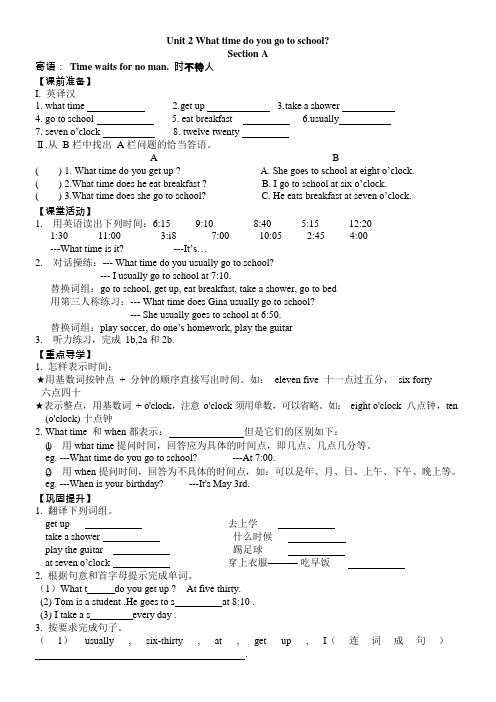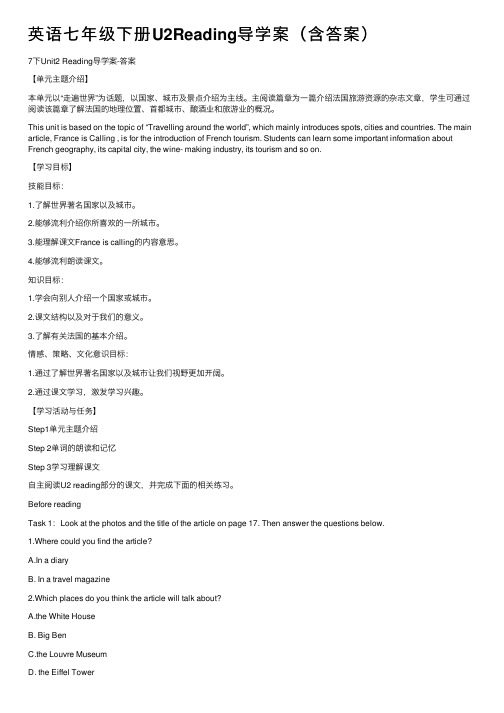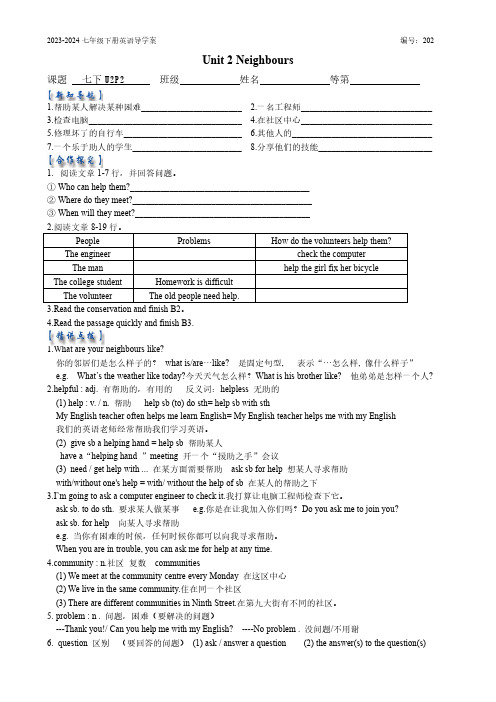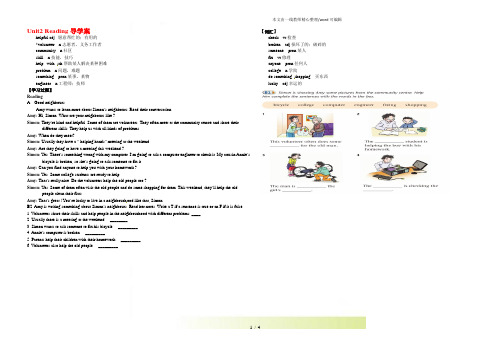七年级下册英语导学案 (2)
人教新目标Go For It! 初中英语七年级下册Unit 2 What time do you go to school$%Section A导学案(2)

Unit 2 What time do you go to school?Section A寄语:Time waits for no man. 时不待人【课前准备】I.英译汉1.what time2.g et up3.t ake a shower4.go to school 7. seven o’clock5. eat breakfast8. twelve twentyuallyⅡ.从 B 栏中找出A 栏问题的恰当答语。
A B( ) 1. What time do you get up ? A. She goes to school at eight o’clock.( ) 2.What time does he eat breakfast ? B. I go to school at six o’clock.( ) 3.What time does she go to school? C. He eats breakfast at seven o’clock.【课堂活动】1. 用英语读出下列时间:6:15 9:10 8:40 5:15 12:201:30 11:00 3:i8 7:00---What time is it? ---It’s…10:05 2:45 4:002.对话操练:--- What time do you usually go to school?--- I usually go to school at 7:10.替换词组:go to school, get up, eat breakfast, take a shower, go to bed用第三人称练习:--- What time does Gina usually go to school?--- She usually goes to school at 6:50.替换词组:play soccer, do one’s homework, play the guitar3.听力练习,完成1b,2a 和2b.【重点导学】1.怎样表示时间:★用基数词按钟点+ 分钟的顺序直接写出时间。
英语七年级下册U2Reading导学案(含答案)

英语七年级下册U2Reading导学案(含答案)7下Unit2 Reading导学案-答案【单元主题介绍】本单元以“⾛遍世界”为话题,以国家、城市及景点介绍为主线。
主阅读篇章为⼀篇介绍法国旅游资源的杂志⽂章,学⽣可通过阅读该篇章了解法国的地理位置、⾸都城市、酿酒业和旅游业的概况。
This unit is based on the topic of “Travelling around the world”, which mainly introduces spots, cities and countries. The main article, France is Calling , is for the introduction of French tourism. Students can learn some important information about French geography, its capital city, the wine- making industry, its tourism and so on.【学习⽬标】技能⽬标:1.了解世界著名国家以及城市。
2.能够流利介绍你所喜欢的⼀所城市。
3.能理解课⽂France is calling的内容意思。
4.能够流利朗读课⽂。
知识⽬标:1.学会向别⼈介绍⼀个国家或城市。
2.课⽂结构以及对于我们的意义。
3.了解有关法国的基本介绍。
情感、策略、⽂化意识⽬标:1.通过了解世界著名国家以及城市让我们视野更加开阔。
2.通过课⽂学习,激发学习兴趣。
【学习活动与任务】Step1单元主题介绍Step 2单词的朗读和记忆Step 3学习理解课⽂⾃主阅读U2 reading部分的课⽂,并完成下⾯的相关练习。
Before readingTask 1:Look at the photos and the title of the article on page 17. Then answer the questions below.1.Where could you find the article?A.In a diaryB. In a travel magazine2.Which places do you think the article will talk about?A.the White HouseB. Big BenC.the Louvre MuseumD. the Eiffel TowerWhile readingTask 2:Match the sub-headings to each paragraph.Paragraph 1 About the centre of FranceParagraph 2 About FranceParagraph 3 About the south of FranceParagraph 4 France has something for everyone Paragraph 5 About Paris, the capital Task 3:Complete the notes below with the information from the article.Task 4:Read the article again and answer the following questions.①Which place in Paris should a person visit if he or she likes shopping?①Where can tourists go in France for a summer holiday? Where for a winter holiday? Post-readingTask 5:Deep thinking :Can you think of another title for the article?Step 4 单词词组句型练习Task 1 :单词拼写1. It is the national f___________ of France, and you can see three colors - blue, white and red.2. Do you know how to speak "Hello" in F___________.3. We can use grapes to make w___________. Have you ever tried it?4. How nice it is to have a trip on this beautiful c___________ in summer!5. Jack is s___________ on the ice with his brother.6. France l_______ in the west of Europe.Task 2 完成句⼦7.我更喜欢在安静的地⽅听⾳乐。
初中英语导学案(七下U2p5)

Unit2Neighbours课题七下U2P5班级姓名等第1.policeman警察(n.)→(pl.)2.postman邮递员(n.)→(pl.)pany公司(n.)→(pl.)4.artist艺术家,画家(n.)→(n.)艺术5.经理6.人7.年纪较长的8.将来9.听起来10.生病的11.办公室职员,上班族12.警察局13.邮局14.在将来15.哥哥16.乘火车/公交车/轮船/自行车1.听录音,完成P25A1部分。
2.听录音,完成P25A2部分。
3.根据P25内容,完成P26A3部分。
4.阅读Speak up对话部分,回答下列问题。
①What is Daniel going to be in the future?______________________________________________________②What is Millie going to be in the future?______________________________________________________③What is Sandy going to be in the future?______________________________________________________④What is Amy going to be in the future?______________________________________________________⑤What is Simon going to be in the future?______________________________________________________1.询问工作:What’s his job?=What does he do?=What is he?2.elder/'eldə(r)/adj.年纪较长的elder与young指兄弟姐妹,子女之间的长幼。
七年级英语下册导学案:M7 U2

备注(教师复备栏及学生笔记)
自
主
学
习
学法指导:1.注意发音,正确朗读生词。2.牢记单词的拼写及词意。3.通过听读对话,学会自主交流预习。
1.独学:将书翻到生词表,拼读P108单词,从bathroom到yesterday.
提示:请用红色笔勾画出你不会拼读的单词。
七年级英语(下)导学案
课型:Reading and Vocabulary
主备人
完成时间
议课时间
共案发放时间
上课时间
审核人
林素芳
第9周
第9周周四
第10周周五
第11、12周
徐海英
班级:
姓名:
小组:
学习目标来自1. Key vocabulary: bathroom, bedroom, garden, living room, east, coast, ago, store, movie theater, bored, president, comfortable, lake, last, yesterday
Two ______ of the USA ______ born in Quincy.
2) Read paragraph 3 & 4, and answer the following questions.
What was Betty’s house like?
How many rooms were there?
4.语法大过关!
1)一般过去时be动词句式的变化:
肯定句结构:主语+__________+其他.
否定句结构:主语+__________+其他.
七年级英语下册:Unit2 Section A(二)导学案 人教新目标板

Unit2 Where's the post office ?一.认定目标1.知识与技能词:(1)单词与短语:neighborhood,just,straight,turn,left,down,right,on the right (2)重点句型:Go straight and turn left.It's down Bridge Street on the right.It's next to a supermarket.2.情感态度与学习策略在理解课文的基础上,同学们互换有关生活、学习等区域的信息,进行实际交流,提高语言的运用能力。
二.预习检测1.根据音标试读单词表中的单词2.单词检测,依照汉语意思,写出下列单词及短语(1)。
中心街道_______________________(2).邮局________________________(3).投币式公用电话____________________ (4).在...对面________________________ (5).在....前面_______________________ (6)在....之后_______________________ (7)在.....附近_______________________ (8).紧靠...._____________________ 三.共同探究1.阅读3a并找出方位介词。
2.大声朗读然后小组间练习对话。
3.再次朗读对话并找出Paul和Nancy在图画中的位置,看谁找的又快又准。
4.根据3a完成3b5.小组活动完成4中的游戏。
四.归纳总结1.巩固记忆本节重点词汇2.怎样问路和指路说说并写出相关句子五.拓展提高1.翻译下列短语。
1. between the bank and the park ________________________2. on Green Street ________________________3. next to the supermarket ________________________4. across from Mingshan Hotel ________________________5. near the restaurant ________________________ 2..用方框中的介词或介词短语填空。
仁爱英语七年级下导学案Unit6 Topic2导学案

Topic 2 My home is in an apartment building.Section A一、课堂导学(本课必背单词、短语、句型)I.单词:1.排房2.农场住宅3.国家,农村4.公寓套房5.租借,出租6.月,月份7.安静的II.短语:1.哪种what kind of2.住在... live in3.一座两层的排房a townhouse with two floors4.和...一起住live with5.在农村,在乡下in the country6.适合学生住的房间a room for students7.适合两人住的房间a room for two people8.每月900元以下under 900¥ a month9.出租for rent10.拨...号给某人call sb at...III.句型:1.你住在什么样的房子里?(你家是什么样的房子?)home do you live in?是一座两层的城市住房。
It’s a townhouse with two floors2.你和你的祖父母住在一起吗?Do you your grandparents?3.迈克尔正在我们学校附近寻找公寓套房。
Michael is an apartment near our school.IV 难点解析:1.kind名词,意为“种类,类型”意为“哪种,什么样的...”拓展:一种许多种各种各样的不同种类的(注意:kind of意为)2.and和with and是并列连词,当连接两个并列主语时表示复数含义,谓语用复数形式;with是介词,如果跟在主语之后,with之后所跟的名词,代词与主语的数无关。
即:A and B做主语谓语动词用复数形式,A with B做主语,谓语动词的形式只和A保持一致。
如:Lucy and I (是)good friends.Lucy with me often (去) to the park.= Lucy often (去) to the park with me.3. for rent 出租。
(完整版)2017最新人教版七年级下册英语科导学案Unit2

Unit 2 What time do you go to school?Section A【教师寄语】No man can do two things at once. 一心不可二用。
【学习目标】1. 熟练掌握本课单词和短语.2. 学会谈论自己及他人的日常生活及日常作息习惯,并能合理安排.3. 初步掌握时间表达法.【学习重点】:1. 进一步掌握what time和when引导的疑问句2. 掌握usually, always never, on weekends 等词的用法。
【学习过程】1.New words and expressionsup /ʌp/ adv.向上dress /dres/v.&n.穿衣服;连衣裙brush /brʌʃ/v.&n.刷;刷净;刷子tooth /tu:θ/n.(pl. teeth /ti:θ/)牙齿shower /'ʃaʊə(r)/n.&v.淋浴;淋浴器(间) usually /'ju:ʒuəli/adv.通常地;一般地forty /'fɔ:(r)ti/num.四十wow/waʊ/int.(表示惊奇或敬佩)哇;呀never /'nevə(r)/adv.从不;绝不early /'ɜ:(r)li/adv.&adj.早(的)station /'steɪʃn/n.电(视)台;车站radio station广播电台o'clock /ə'klɒk/, /ə'klɑ:k/"adv.(表示整点)……点钟funny /'fʌni/adj.奇怪的;滑稽好笑的exercise/'eksəsaɪz/v.&n.锻炼;练习best/best/ adj.&adv.最好的;最好地;最group /ɡru:p/n.组;群get up 起床take a shower 洗淋浴fifty/'fɪfti/num.五十job /dʒɒb/, /dʒɑ:b/n.工作;职业work /wɜ:(r)k/v.&n.工作night /naɪt/n.晚上;夜晚get dressed 穿上衣服go to school 去上学be late for 迟到go to work 去上班2. Read and practice1) ---What time do you usually get up? 你通常几点起床?---I usually get up at six thirty. 我通常六点半起床。
初中英语导学案(七下U2p2)

Unit2Neighbours课题七下U2P2班级姓名等第1.帮助某人解决某种困难_______________________2.一名工程师______________________________3.检查电脑___________________________________4.在社区中心______________________________5.修理坏了的自行车___________________________6.其他人的________________________________7.一个乐于助人的学生_________________________8.分享他们的技能__________________________1.阅读文章1-7行,并回答问题。
①Who can help them?_________________________________________②Where do they meet?_________________________________________③When will they meet?________________________________________2.阅读文章8-19行。
People Problems How do the volunteers help them?The engineer check the computerThe man help the girl fix her bicycleThe college student Homework is difficultThe volunteer The old people need help.3.Read the conservation and finish B2。
4.Read the passage quickly and finish B3.。
人教新目标七年级下册英语导学案Unit 2 What time do you go to school

承德四中年级学科导学案.主备人:审核人:审批人:编号:课题:Unit 2 What time do you go to school? 第一课时课型:听说课第一标:设置目标(5分钟)【学习目标】知识目标1:能掌握以下单词和短语:up, dress, brush, tooth (pl. teeth), shower, get up, get dressed, brush teeth,take a shower, go to school, eat breakfast2.能掌握以下句型:①—What time is it? —It’s ….②—What time do you usually get up? —I usually get up at six thirty.③—What time does Bob usually get up? —He usually gets up at five thirty. 第二标:达成目标(25分钟)学法指导1.Pairwork(要求学生两人一组练习。
): —What time is it? —It’s ….2. 听录音,完成活动1b,把时间与活动的匹配(组内检查)。
3.谈论日常生活:—What time do you usually get up? —I usually get up at six thirty.4.听录音,完成活动2a,2b(组内检查)。
小组内复述Jim一家的淋浴时间,第三标:反馈目标(15分钟)一. 根据汉语写单词、短语:起床_______________穿上衣服___________________洗淋浴_________________刷、刷净__________________牙齿(单、复数形式)________ __________二、翻译句子:Time is money. Time is life. Time flies. ______三. 单项选择:( )1. Tony usually gets up___5 o’clock. A. in B. at C. on D. about ( )2. —W hat’s the English for 8:10? —It’s ______.A. eight tenB. ten eightC. ten to eightD. eight past ten( )3. He_____up at 7:00 and_____the early morning news(新闻) on TV.A. gets, seesB. get, watchC. gets, watchesD.get, see( )4. What time _______she_______?A. do, go to schoolB. does, goes to schoolC. does, go to the schoolD. does, go to school( )5. _______does your father usually ____ a shower?A. What time, takesB. What’s time, takeC. What time, ta keD. What’s time, takes( ) 6.He gets up early. So he has ______ time for breakfast.A. manyB. a lotC. lots ofD. lot of四、句型转换。
牛津译林版七年级下册Unit2Neighbours(区一等奖)

Unit2 Neighbours导学案1.两者均可用来表示将来的意图,但"be going to"结构语义稍强些。
例如:They are going to climb the Qomolangma one day.他们准备/想将来某一天去爬珠穆朗玛峰。
2.对于事先经过考虑的打算、计划、意图, 应使用be going to, 而不是will 结构。
例如:— What are you going to do next Sunday?下星期天你打算干什么?— I'm going to go fishing. 我打算去钓鱼。
3.对于未经过考虑的打算,计划,只是临时之意,则用will 结构,不用be going to 结构。
例如:— Where is the telephone book? 电话号码簿在哪儿?— I'll go and get it for you. 我去给你拿。
4.在表示即将发生某事时,两者区别意义不大,多可互换。
例如:What is going to happen? 就要发生什么事?What will happen? 将要发生什么事?一般说来,be going to 表示较近的将来,而will 则表示较远的将来。
试比较:It is going to snow tonight. 今晚要下雪。
There will be a strong wind in a few days. 几天后将有一场大风。
5.表示不受人的主观意愿影响的单纯将来,一般只能用will结构。
例如:Tomorrow will be April Fools' Day. 明天是愚人节。
6.在正式的通知(如新闻媒体公布的官方消息,气象预报等)中用will结构。
例如:There will be a heavy rain to the south of Huai River.淮河以南将有大雨。
七年级英语下册Unit 2 Neighbours导学案牛津译林版

七年级英语下册Unit 2 Neighbours导学案(牛津译林版)Unit 2 Neighbours名词邮局生病的;恶心的邻居人较好;更好参观者,访问者工作年纪较长的(餐馆等)服务员将来代词街区,居民区艺术家某事;某物志愿者布告、通知某人社区信息任何人技能,技巧组、群任何事问题,难题动词介词工程师检查像,类似;---怎么样学院设计,构思副词火修理下面经理情态动词感叹词办公室1)将,将会哇,呀办公室职员2)将,将会词组警察系动词帮助某人解决某种困难邮递员听起来买东西公司形容词后天局、所、站有用的生火警察局损坏了的,破碎的乘火车/公交车/轮船/自行车邮政幸运的为---担心Part 1 (P18 -19)课前自主学习重点单词1.邻居___________2.参观者_________3.类似;---怎么样_________4.街区;居民区_____________5.将会______ II. 重点词语1. 拜访我们的新邻居____________________________2. 欢迎像你一样的来访者________________________3.我恐怕…____________________________________ 4.把---与---匹配________________________________ 5. 在第九大街__________________________________ 6.城市花园的一套公寓__________________________ 7.多少栋楼____________________________________ 8.他们中的大多数______________________________ 9.在你们的社区周围____________________________ 10. 住在像那样的社区___________________________课堂知识点拨1. Where are you going? 译:_______________________________ 注意 Where引导的疑问句后面不能出现to看P119讲解填空 be going to do sth. 结构用来谈论______________的事情。
人教版七年级下册英语导学案:Unit 2 What time do you go to school

Unit 2 What time do you go to school?Period 1(Section A 1a~2c)自主学习课前诊断一.温故互查1起床 2. 去上学3.穿衣服4.刷牙5.吃早饭6.洗澡7.几点8.Jim的家9.我的最后一个问题二.设问导读Task 1. New words and sentences patterns.1. How to ask the timeA:What time is it?B:It’s …2.PairworkA:What time do you usually…?B:I usually ….at….3. PairworkA:What time does he/she…?B:He/She… s/es at…Task2. ListeningI Before listeningRead the statements in 1b.II.While listening1.Listen and choose the right answer. (1b)2. Listen and then finish 2a and 2b.III.After listeningFill in the missing word.Rick has a_______ morning. He usually gets up at ________ .He brushes his teeth and takes a showerat___________At seven o’clock ,he has ________ .He usually gets________at seven twenty .And then he usually goes to school at seven __________ .三.自学检测根据汉语提示补全下面的短文。
I usually______(起床) at 6:50. I have milk and bread____ breakfast. After breakfast, I ____________ (洗澡)and then I __________(上学) by bus. I get to school at 7:50. I have five classes in the morning. And then I have lunch at 12:10. In the afternoon I have two classes. I _______(回家) at 3:30. I get home at 4:30 p.m.I __________(吃晚饭) at about 8:30. After dinner, I ___________(做作业) . I _________ (睡觉) at 10:00. My life is busy but not exciting.互动学习问题解决What time ,when ______is your birthday ?It’s May 6th .__________do people have lunch ? In the evening .___________do you go to school ? At 7:00 .Shower .I usually take a _____at 6:00 in the morning .My family has a ______.What time do you usually ______?学用结合提高能力单项选择( ) 1.Jones often gets up _____7:30 _____ the morning.A. in; atB. at; inC. at; on( ) 2. —My birthday is _____ June. When is your birthday?— It’s _____ Tuesday, June 7th .A. in; inB. on; onC. in; on( ) 3. Bob wants to have a party _____ the evening of June 5th.A. onB. inC. at( ) 4. Lucy gets up early to meet his friend_____ Sunday morning.A. onB. inC. at( ) 5. Let’s meet _____15:00 this afternoon..A. atB. inC. on课堂小结,形成网络介绍你的早晨。
2022年牛津译林版七年级英语下册Unit2 Reading导学案

本文由一线教师精心整理/word 可编辑1 / 4Unit2 Reading 导学案【词汇】helpful adj. 愿意帮忙的;有用的 *volunteer n.志愿者,义务工作者 community n.社区 skill n.技能,技巧help . with sth.帮助某人解决某种困难 problem n.问题,难题something pron.某事,某物 engineer n.工程师;技师 check vt.检查broken adj.损坏了的;破碎的 someone pron.某人 fix vt.修理anyone pron.任何人 college n.学院do something shopping 买东西 lucky adj.幸运的【学习过程】 ReadingA Good neighboursAmy wants to learn more about Simon ’s neighbours. Read their conversation. Amy: Hi, Simon. What are your neighbours like ?Simon: They ’re kind and helpful. Some of them are volunteers. They often meet at the community centre and share theirdifferent skills. They help us with all kinds of problems.Amy: When do they meet?Simon: Usually they have a “ helping hands ” meeting at the weekend. Amy: Are they going to have a meeting this weekend ?Simon: Yes. There ’s something wrong with my computer. I ’m going to ask a computer engineer to check it. My cousin Annie ’sbicycle is broken, so she ’s going to ask someone to fix it.Amy: Can you find anyone to help you with your homework ? Simon: Yes. Some college students are ready to help.Amy: That ’s really nice. Do the volunteers help the old people too ?Simon: Yes. Some of them often visit the old people and do some shopping for them. This weekend, they ’ll help the oldpeople clean their flats.Amy: That ’s great ! You ’re lucky to live in a neighbourh ood like that, Simon.B2. Amy is writing something about Simon ’s neighbours. Read her notes. Write a T if a sentence is true or an F if it is false. 1. V olunteers share their skills and help people in the neighbourhood with different problems. ____ 2. Usually there is a meeting at the weekend. ________3. Simon wants to ask someone to fix his bicycle. _________4. Annie ’s computer is broken. _________5. Parents help their children with their homework. _________6. V olunteers also help the old people. _________【知识建构】1. They help us with all kinds of problems.【语言点1】help常用结构①help with sth.“在某方面帮助某人/ 帮助某人(解决某种困难)”②help ( to ) do sth.“帮助某人做某事”【典例精选1】I usually ___________________________________________(帮我弟弟学数学). 【拓展】与help相关的短语:help oneself to...随便吃......with the help of sth. / with one’s help在某人的帮助下【典例精选2】①你们随便吃些面包吧。
【K12学习】新目标七年级下册Unit2Whereisthepostoffice-导学案

新目标七年级下册Unit2Whereisthepostoffice?导学案七年级下Unit2hereisthepostoffice?课时单元主题:Asforandgivedirections.询问方位,以及给出方位。
单元目标:学习并掌握一些表示方位的介词。
学习并掌握一些形容词的用法。
学习并掌握一些常见地方的名称。
主要句型和交际用语:here’sthepar?It’soncenterstreet.Thesuperaretisacrossfrotheban.Thepayphoneisnexttothepostoffice.Thelibraryisbeteenthevideoarcadeandthesuperaret.Isthereapayphoneintheneighborhood?It’sdontheBridgeStreetontheleft.主要词汇:postoffice,Isthere…?,ban,near,here,center,street,bridge,hotel,video,arcade,superaret,pay,payphone,par,across,acrossfro,nextto,beteen,avenue,don,neighborhood,right,left,quiet,big,dirty,busy,false,ele,garden,district,turn,off,enjoy,al,taeaal,through,ill,see,house,begin,beginning,tour,e,get,oney,buacross介词“横过”Becarefulhenyoualacrossthebusystreet.当你穿过繁忙的街道时要小心。
Theducantstosiacrosstheriver.那只鸭子想游过这条小河。
acrossfro介词词组“在…对过”ThebanisacrossfroFc.银行在肯德基的对面。
新外研版七年级英语下册导学案(M1-Unit 2)

Unit 2 Are they yours?第三课时一、学习目标1.能够熟练运用失物招领方面的词汇短语。
2.能够熟练掌握名词性物质代词。
3. 能写出简单的失物招领启事。
二、学习重点1、名词所有格;2、名词性物主代词的用法三、学习难点1、名词所有格;2、名词性物主代词的用法课前预习一、使用说明与学法指导1、试读单词表中本单元的单词,不会读的在单词下用红笔划上横线2、使用快读和细读两种阅读的方法里查找文章的信息二、预习自测Ⅰ、重点词汇拓展1. 机场;航空港____________2. 百________3. 千________4. 几百;成百上千________ _______5. 飞机________6. 奇怪的_______7. 寻找_________ 8. 香肠_________Ⅱ、用所给词的正确形式填空1. Mike often ________(play) football.2. ________ you ________(like) Chinese food or Western food?3. My English________(teach) is an old American.4. —I feel very bored.—What about ________(see) a film at the cinema?5. Jerry ________(not do) his homework at noon6. There ________(be) a pen and two boos on the desk.三、我的疑惑:________________________________________________________课内探究Step 1 Warming-up1. Show some pictures to review the words of school things.2. Review the text of Unit 1.3. Read the words after the teacher.4. Introduce the new words.Step 2 Complete the sentences.1. Ask the students to read the words in the box in Activity 1.camera computer mobile phone2. Look at pictures in Activity 1 carefully.3. Read through the sentences.A man is talking to a woman at the lost and found offic e. He’s looking for his ______.A man i s getting on the bus. His ________ is lost.4. Complete the sentences with the correct words and expression from the box5. Ask the students to check with a partner.6. Check the answers:Step 3 Reading.1. Play the recording.2. Ask the students to read through the passage.3. Read the passage and answer the questions.1) When do people often lose things?2) Why are there lost and found offices at airports and stations?3) What do people do at the lost and found office?4) What strange things are there at the New York City Lost and Found Office?4. Check with a partner.5. Call back the answers from the whole class.6. Read the text together.7. Learning to learn.Reading passages with interesting facts can help you understand and remember English. Try to find passages with facts to read.Step 4 Do exercises. 1. Ask th e students to the words in the box in Activity 3.airport hundreds of large lose sausage station strange2. Ask the students to read through the passage in Activity3.People in a hurry often (1)__________ things, and there are (2)__________ things at lost and found offices at (3)__________ and (4)__________. At the New York City Lost and Found Office, there are also some very (5)__________ things. There are fifteen kilos of (6)__________ — are they yours? And how do you lose a (7)__________ boat on a train?3. Complete the passage with the correct from of the words and expression from the box..4. Check with a partner.5. Call back the answers from the whole class.6. Read the passage together.Step 5 Guessing game.1. Show some pictures.2. According to the information given and ask the students to guess what it is.3. Show the pictures to check the answer s.Step 6 Writing.4. Read the lost and found notes. Write notes for two more things.2. Check with a partner.3. Call back the a nswers from the whole class.当堂检测Ⅰ、 完成句子1. 当人们旅行时经常丢东西。
新外研版七年级英语下册导学案(M11-Unit 2)

Unit 2 Here are some ways to welcome them第三课时一、学习目标:1.能正确拼写M11U2单词17个和短语5个,能读懂简单的介绍不同国家身势语的短文。
2.通过自主学习和合作探究,学会略读与细读方法,抓住关键信息,理解课文。
3.通过阅读关于身势语的文章,提高对英语的学习兴趣。
二、学习重点能正确拼写本单元单词和短语三、学习难点能读懂简单的介绍不同国家身势语的短文。
课前预习使用说明与学法指导:1.根据预习要求先预习理解课文并勾划短语2.限时完成学案预习自测:1.用英语写出下列单词和短语。
脚手指膝盖腿嘴身体外国的北美人个人的南美人礼貌的某处挥手事实上粗鲁的手挽手站得太近根本不私人空间道别…的方法…迟到2. 预习P68课文,根据课文内容,判断下列句子的对错。
(对的打“√”,错的打“×”。
)(1)When you talk to a friend, you can stand close in the Middle East and North Americans.()(2)Girls like walking arm in arm with their friends in China. ()(3)In Britain, people don’t like to touch other people. ()(4)It isn’t polite to look at people when you talk in the US and Britain. ()(5)In Greece, it isn’t polite to wave to say goodbye.()我的疑惑:______________________________________________________课内探究Step1、Fast reading to find key sentence for each paragraphHere are some ways to welcome them. paragraph()How close do you stand when you talk a friend? paragraph()How about touching people? paragraph()Do you look at people when you talk paragraph()How do you say goodbye? paragraph()Step2、Listen again and check the sentences1. When you talk to a friend, you can stand close in the Middle East and North Americans.()2. Girls like walking arm in arm with their friends in China. ()3. In Britain, people don’t like to touch other people. ()4. It isn’t polite to look at people when you talk in the US and Britain. ()5. In Greece, it isn’t polite to wave to say goodbye.()Step 3、Complete the passage with the words from the box.Lingling: People from (1) ________ countries have different body language from us. In (2) ________ people don’t like to touch other people, but in South America they like to (3) _______ o n to you so you can’t (4) _______ away. Remember to give (5) __________ from North America lots of (6) _________ space. In some countries it isn’t (7) _______ to look at people when you talk. And it is n’t polite to (8) ______ goodbye in Greece. In (9) _______, it’s quite (10) _______!四、当堂检测Check the body language you can use in different countries and places.Stand closeTouch eachotherLook at people whentalkingBritainMiddle EastSouth AmericaUS五、课后反思:Britain, fact, foreign, hold, move personal, polite, rude, someone, wave六、课后训练1.根据首字母完成单词1)Our new f___ ____ students are going to arrive very soon.2)Please give them more p___________space.3)South Americans sometimes h__________your arm when they talk to you.4)In some places, it's p__ ______ to look at people when you talk.5)In other countries, it's r____ __ to look at people when you talk.6)W___ ___ to say goodbye is all right in China.2. 默读课文,回答下列问题。
- 1、下载文档前请自行甄别文档内容的完整性,平台不提供额外的编辑、内容补充、找答案等附加服务。
- 2、"仅部分预览"的文档,不可在线预览部分如存在完整性等问题,可反馈申请退款(可完整预览的文档不适用该条件!)。
- 3、如文档侵犯您的权益,请联系客服反馈,我们会尽快为您处理(人工客服工作时间:9:00-18:30)。
Unit9 How was your weekend?
第二课时Section A (2a-4)
一、导学目标:
1、掌握下列词汇visit 、test 、what about……?stay at home 、have、do some reading 、
practice 、regular verb、irregular、present 、past、mountain
2、学会询问和叙述他人的周末都做了什么以及周末过的怎么样。
3、通过本节课的学习,可以使学生能进一步了解其他同学的课余生活,增加友谊。
二、导学重难点:
1、重点:
询问和叙述他人的周末都做了什么以及周末过的怎么样。
2.、难点:
学会询问和叙述他人的周末都做了什么以及周末过的怎么样。
三、导学方法:自学、合作探究、学---展---测
★自主学案
(一)预习指导
A 预习2a-4新单词并掌握。
B 知识点拨
① How was your weekend?你的周末如何?
这是一个常见的问候句型,was是be动词am/is的过去式。
对此类问候回答常用以下句型:It was great. 太棒了。
It was OK. 还不错。
It wasn’t very good. 不是很好。
②动词过去式的构成分为规则和不规则,规则的常见如何:
1、动词加ed。
play
2、结尾时e加d。
dance
3、只有一个辅音字母的重读闭音节单词双写辅音字母加ed。
stop
4、辅音字母加y结尾变y为i加ed。
study
③ do some reading =read 阅读
do some ving = v.
④ practice doing sth. 练习做某事
Eg:practice speaking English
(二)预习检测
写出下列动词的过去式
go is visit study play have
practice clean look watch stop
汉译英
为英语考试而学习练习英语举行晚会
做作业看电视阅读呆在家里。
★课堂导学
1、比一比,赛一赛。
找出2a-4的动词短语,看谁找的最多最快。
2、问你的同伴周末做了什么?
用2c里的短语来回答(注意时态哟!)
3、用过去时态询问别人的周末过得怎么样用?
回答是①②③
4、游戏,用一幅图片表示你周末所做的事情,其他同学猜你做了什么,看哪个同学猜的最快。
★课堂检测
一、改错
1、Do you play basketball last year?
2、What was Lucy’s birthday party last night?
3、They went to mountain with their teacher.
4、We have a good time yesterday morning.
二、汉译英
1、你的周末怎样?不错。
2、我上个周末打扫房间,为数学考试而学习。
______________________________________________________。
